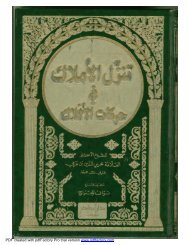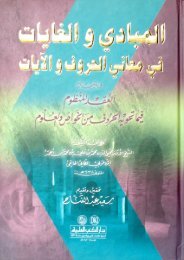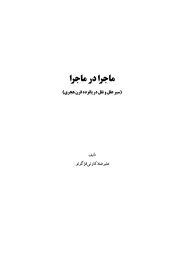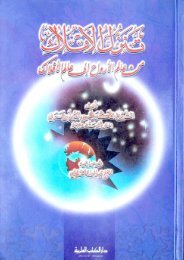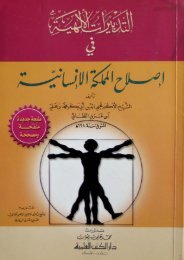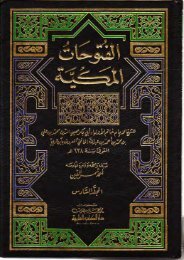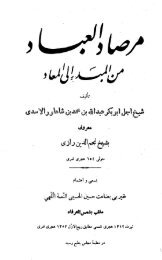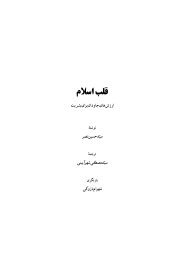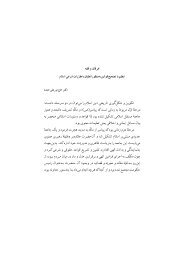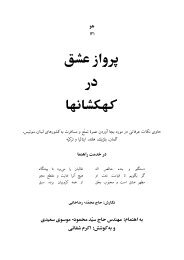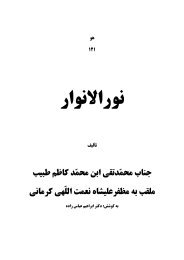- Page 6 and 7: introductionRecognized as perhaps t
- Page 8: erable, and they rose as one to rus
- Page 13 and 14: what makes an act right or wrong, g
- Page 15 and 16: But Its lock is nothing next to Its
- Page 17 and 18: lindness that Rumi is speaking to w
- Page 19: Fihi ma Fihi is cut from the same c
- Page 24 and 25: 4 V DISCOURSES OF RUMImap out for t
- Page 26 and 27: 6 V DISCOURSES OF RUMI“Look!” t
- Page 28 and 29: 8 V DISCOURSES OF RUMIMohammed said
- Page 30 and 31: 10 V DISCOURSES OF RUMIyour intenti
- Page 32 and 33: discourse 2Someone said: “Our Mas
- Page 34 and 35: 14 V DISCOURSES OF RUMIthe root is
- Page 36 and 37: 16 V DISCOURSES OF RUMIdows to shin
- Page 38 and 39: 18 |||labe, what could they know of
- Page 40 and 41: 20 V DISCOURSES OF RUMIand nasty, y
- Page 42 and 43: 22 V DISCOURSES OF RUMIprayer were
- Page 44 and 45: 24 V DISCOURSES OF RUMIThere was on
- Page 46 and 47: discourse 4Someone said: “There i
- Page 48 and 49: 28 V DISCOURSES OF RUMItook a Damas
- Page 50 and 51: 30 V DISCOURSES OF RUMIlower world
- Page 52 and 53: 32 V DISCOURSES OF RUMI“You have
- Page 54 and 55: discourse 5The Amir, surprised by a
- Page 56 and 57: 36 V DISCOURSES OF RUMIYet, even th
- Page 58 and 59: 38 V DISCOURSES OF RUMIbecoming a m
- Page 60 and 61:
40 V DISCOURSES OF RUMI“Our king
- Page 62 and 63:
42 V DISCOURSES OF RUMIthings?” W
- Page 64 and 65:
44 V DISCOURSES OF RUMIto anyone bu
- Page 66 and 67:
46 V DISCOURSES OF RUMIand become n
- Page 68 and 69:
48 V DISCOURSES OF RUMIning, yet it
- Page 70 and 71:
discourse 7The son of the Amir ente
- Page 72 and 73:
52 V DISCOURSES OF RUMIpleasure and
- Page 74 and 75:
54 V DISCOURSES OF RUMIseated liste
- Page 76 and 77:
56 V DISCOURSES OF RUMIwithout end.
- Page 78 and 79:
discourse 8Someone asked: “What i
- Page 80 and 81:
60 V DISCOURSES OF RUMIenjoying my
- Page 82 and 83:
62 V DISCOURSES OF RUMIIt was for t
- Page 84 and 85:
discourse 9Someone said: “A man c
- Page 86 and 87:
66 V DISCOURSES OF RUMIwould bring
- Page 88 and 89:
discourse 10The Amir said to Rumi:
- Page 90 and 91:
70 V DISCOURSES OF RUMIthe owner ma
- Page 92 and 93:
72 V DISCOURSES OF RUMIthey really
- Page 94 and 95:
74 V DISCOURSES OF RUMIment. Just a
- Page 96 and 97:
76 V DISCOURSES OF RUMIand powerful
- Page 98 and 99:
78 V DISCOURSES OF RUMIThe man acte
- Page 100 and 101:
80 V DISCOURSES OF RUMIto pay honor
- Page 102 and 103:
82 V DISCOURSES OF RUMIcould not se
- Page 104 and 105:
84 V DISCOURSES OF RUMItheir own ac
- Page 106 and 107:
86 V DISCOURSES OF RUMIpowerless, w
- Page 108 and 109:
88 V DISCOURSES OF RUMIA prince ord
- Page 110 and 111:
90 V DISCOURSES OF RUMIes the Kaaba
- Page 112 and 113:
92 V DISCOURSES OF RUMIan atom’s
- Page 114 and 115:
94 V DISCOURSES OF RUMITherefore th
- Page 116 and 117:
96 V DISCOURSES OF RUMIall sorts of
- Page 118 and 119:
discourse 12After the Amir arrived,
- Page 120 and 121:
100 V DISCOURSES OF RUMIMohammed’
- Page 122 and 123:
102 V DISCOURSES OF RUMImidst of th
- Page 124 and 125:
104 V DISCOURSES OF RUMIever comes
- Page 126 and 127:
106 V DISCOURSES OF RUMIknows his L
- Page 128 and 129:
108 V DISCOURSES OF RUMIthought tho
- Page 130 and 131:
110 V DISCOURSES OF RUMIscent follo
- Page 132 and 133:
discourse 13Mohammed said, “The n
- Page 134 and 135:
114 V DISCOURSES OF RUMIarrives and
- Page 136 and 137:
116 V DISCOURSES OF RUMIThere are b
- Page 138 and 139:
118 V DISCOURSES OF RUMIcommotion v
- Page 140 and 141:
120 V DISCOURSES OF RUMIRumi answer
- Page 142 and 143:
122 V DISCOURSES OF RUMIwrongs and
- Page 144 and 145:
124 V DISCOURSES OF RUMIthe general
- Page 146 and 147:
126 V DISCOURSES OF RUMIshown you a
- Page 148 and 149:
128 V DISCOURSES OF RUMIthese words
- Page 150 and 151:
130 V DISCOURSES OF RUMIa day. Both
- Page 152 and 153:
132 V DISCOURSES OF RUMItouch.” I
- Page 154 and 155:
134 V DISCOURSES OF RUMII find no s
- Page 156 and 157:
136 V DISCOURSES OF RUMIthey have n
- Page 158 and 159:
discourse 17The Amir of Rum said:
- Page 160 and 161:
140 V DISCOURSES OF RUMIsensuality.
- Page 162 and 163:
142 V DISCOURSES OF RUMIand exhaust
- Page 164 and 165:
144 V DISCOURSES OF RUMIeven though
- Page 166 and 167:
146 V DISCOURSES OF RUMImy Lord, th
- Page 168 and 169:
148 V DISCOURSES OF RUMISaying this
- Page 170 and 171:
150 V DISCOURSES OF RUMIthat charm
- Page 172 and 173:
152 V DISCOURSES OF RUMIthem. If we
- Page 174 and 175:
154 V DISCOURSES OF RUMI“Woe to t
- Page 176 and 177:
156 V DISCOURSES OF RUMIBy enduring
- Page 178 and 179:
158 V DISCOURSES OF RUMIsame and wi
- Page 180 and 181:
160 V DISCOURSES OF RUMIhave achiev
- Page 182 and 183:
162 V DISCOURSES OF RUMIRumi answer
- Page 184 and 185:
164 V DISCOURSES OF RUMIis indiffer
- Page 186 and 187:
166 V DISCOURSES OF RUMIserve their
- Page 188 and 189:
168 V DISCOURSES OF RUMIror people
- Page 190 and 191:
discourse 22Rumi said to Ibn Chavis
- Page 192 and 193:
172 V DISCOURSES OF RUMIpleased wit
- Page 194 and 195:
discourse 23Rumi said: I would like
- Page 196 and 197:
176 V DISCOURSES OF RUMIit. Yet som
- Page 198 and 199:
178 V DISCOURSES OF RUMIthat in you
- Page 200 and 201:
180 V DISCOURSES OF RUMIthread of t
- Page 202 and 203:
182 V DISCOURSES OF RUMIto ward off
- Page 204 and 205:
184 V DISCOURSES OF RUMIof their lo
- Page 206 and 207:
186 V DISCOURSES OF RUMIother world
- Page 208 and 209:
188 V DISCOURSES OF RUMIthe chaff i
- Page 210 and 211:
190 V DISCOURSES OF RUMIEverything
- Page 212 and 213:
192 V DISCOURSES OF RUMIconfusion.
- Page 214 and 215:
194 V DISCOURSES OF RUMIsome sign,
- Page 216 and 217:
196 V DISCOURSES OF RUMIburden. God
- Page 218 and 219:
discourse 26Rumi said: If I appear
- Page 220 and 221:
200 V DISCOURSES OF RUMIing, “The
- Page 222 and 223:
202 V DISCOURSES OF RUMITheir meani
- Page 224 and 225:
204 V DISCOURSES OF RUMIsubject I k
- Page 226 and 227:
206 V DISCOURSES OF RUMIreject the
- Page 228 and 229:
208 V DISCOURSES OF RUMI“What did
- Page 230 and 231:
210 V DISCOURSES OF RUMI“Teacher,
- Page 232 and 233:
212 V DISCOURSES OF RUMIus, all oth
- Page 234 and 235:
214 V DISCOURSES OF RUMIa living bl
- Page 236 and 237:
216 V DISCOURSES OF RUMIWhat Umar d
- Page 238 and 239:
218 V DISCOURSES OF RUMIwhat is ima
- Page 240 and 241:
220 V DISCOURSES OF RUMIThat night
- Page 242 and 243:
222 V DISCOURSES OF RUMIGod—the S
- Page 244 and 245:
224 V DISCOURSES OF RUMIattained un
- Page 246 and 247:
226 V DISCOURSES OF RUMIforms? More
- Page 248 and 249:
228 V DISCOURSES OF RUMIlands and c
- Page 250 and 251:
discourse 30There are heads that ar
- Page 252 and 253:
232 V DISCOURSES OF RUMIseparated f
- Page 254 and 255:
discourse 31The police are always i
- Page 256 and 257:
236 V DISCOURSES OF RUMIyou to have
- Page 258 and 259:
238 V DISCOURSES OF RUMIGod bestows
- Page 260 and 261:
discourse 32Knowingness is the perf
- Page 262 and 263:
discourse 33Everyone is in the mids
- Page 264 and 265:
discourse 34Rumi said: I saw our fr
- Page 266 and 267:
246 V DISCOURSES OF RUMIin graces a
- Page 268 and 269:
248 V DISCOURSES OF RUMIwithin them
- Page 270 and 271:
250 V DISCOURSES OF RUMIof that is
- Page 272 and 273:
252 V DISCOURSES OF RUMIsciences yo
- Page 274 and 275:
254 V DISCOURSES OF RUMIWhen God wi
- Page 276 and 277:
discourse 38The Prophet was seated
- Page 278 and 279:
258 V DISCOURSES OF RUMIthe earth,
- Page 280 and 281:
260 V DISCOURSES OF RUMIname. When
- Page 282 and 283:
262 V DISCOURSES OF RUMIthousand re
- Page 284 and 285:
264 V DISCOURSES OF RUMIThe words o
- Page 286 and 287:
266 V DISCOURSES OF RUMIwho cannot
- Page 288 and 289:
discourse 40Jauhar, the Sultan’s
- Page 290 and 291:
270 V DISCOURSES OF RUMIvein is the
- Page 292 and 293:
272 V DISCOURSES OF RUMIself and to
- Page 294 and 295:
discourse 41We are like bowls on th
- Page 296 and 297:
276 V DISCOURSES OF RUMISince you o
- Page 298 and 299:
278 V DISCOURSES OF RUMIYou say thi
- Page 300 and 301:
280 V DISCOURSES OF RUMIAlthough th
- Page 302 and 303:
282 V DISCOURSES OF RUMIwoman. Inde
- Page 304 and 305:
284 V DISCOURSES OF RUMIthat the se
- Page 306 and 307:
discourse 43Our friend, Saif al-Buk
- Page 308 and 309:
288 V DISCOURSES OF RUMILike the pe
- Page 310 and 311:
290 V DISCOURSES OF RUMIthis city a
- Page 312 and 313:
292 V DISCOURSES OF RUMI“TA HA: W
- Page 314 and 315:
294 V DISCOURSES OF RUMIhenceforth
- Page 316 and 317:
296 V DISCOURSES OF RUMIIt is said
- Page 318 and 319:
298 V DISCOURSES OF RUMIand the sai
- Page 320 and 321:
300 V DISCOURSES OF RUMI“May the
- Page 322 and 323:
302 V DISCOURSES OF RUMIlegs and sl
- Page 324 and 325:
304 V DISCOURSES OF RUMII said to m
- Page 326 and 327:
discourse 45Rumi asked: What is the
- Page 328 and 329:
308 V DISCOURSES OF RUMI“God is a
- Page 330 and 331:
310 V DISCOURSES OF RUMIyou know th
- Page 332 and 333:
312 V DISCOURSES OF RUMIthe child,
- Page 334 and 335:
314 V DISCOURSES OF RUMIer turning
- Page 336 and 337:
316 V DISCOURSES OF RUMIremained hi
- Page 338 and 339:
318 V DISCOURSES OF RUMIstrated wit
- Page 340 and 341:
discourse 47God wills both good and
- Page 342 and 343:
322 V DISCOURSES OF RUMIwhatever.
- Page 344 and 345:
324 V DISCOURSES OF RUMIwhen a man
- Page 346 and 347:
326 V DISCOURSES OF RUMIfilth, the
- Page 348 and 349:
328 V DISCOURSES OF RUMIGod said,
- Page 350 and 351:
330 V DISCOURSES OF RUMIinstance, i
- Page 352 and 353:
332 V DISCOURSES OF RUMIlet them wo
- Page 354 and 355:
334 V DISCOURSES OF RUMItheir sleep
- Page 356 and 357:
336 V DISCOURSES OF RUMIHumanity’
- Page 358 and 359:
338 V DISCOURSES OF RUMIeating, the
- Page 360 and 361:
340 V DISCOURSES OF RUMIthe tree fe
- Page 362 and 363:
342 V DISCOURSES OF RUMIA student s
- Page 364 and 365:
344 V DISCOURSES OF RUMISomeone sai
- Page 366 and 367:
346 V DISCOURSES OF RUMIsee him and
- Page 368 and 369:
discourse 52Rumi was asked the mean
- Page 370 and 371:
350 V DISCOURSES OF RUMIsame—it e
- Page 372 and 373:
352 V DISCOURSES OF RUMIwhen the pe
- Page 374 and 375:
discourse 53Rumi was asked the mean
- Page 376 and 377:
356 V DISCOURSES OF RUMIthey recove
- Page 378 and 379:
discourse 54Rumi said: When I first
- Page 380 and 381:
360 V DISCOURSES OF RUMIhood, peopl
- Page 382 and 383:
362 V DISCOURSES OF RUMIin our eyes
- Page 384 and 385:
364 V DISCOURSES OF RUMIbe in them,
- Page 386 and 387:
366 V DISCOURSES OF RUMItwo lived t
- Page 388 and 389:
368 V DISCOURSES OF RUMIleather, th
- Page 390 and 391:
370 V DISCOURSES OF RUMIbring life
- Page 392 and 393:
discourse 56Rumi said: You are now
- Page 394 and 395:
374 V DISCOURSES OF RUMIThis is not
- Page 396 and 397:
376 V DISCOURSES OF RUMIing me piec
- Page 398 and 399:
378 V DISCOURSES OF RUMIand fondnes
- Page 400 and 401:
discourse 58Rumi related: A certain
- Page 402 and 403:
382 V DISCOURSES OF RUMIable to aug
- Page 404 and 405:
384 V DISCOURSES OF RUMIsubtler and
- Page 406 and 407:
386 V DISCOURSES OF RUMIThis is our
- Page 408 and 409:
388 V DISCOURSES OF RUMIEveryone go
- Page 410 and 411:
390 V DISCOURSES OF RUMIIf a blind
- Page 412 and 413:
discourse 61Hearing something over
- Page 414 and 415:
394 V DISCOURSES OF RUMIUmar said t
- Page 416 and 417:
396 V DISCOURSES OF RUMIsixth finge
- Page 418 and 419:
discourse 62Some say that love is t
- Page 420 and 421:
400 V DISCOURSES OF RUMImakes the b
- Page 422 and 423:
402 V DISCOURSES OF RUMIyou at all,
- Page 424 and 425:
404 V DISCOURSES OF RUMIforms and b
- Page 426 and 427:
406 V DISCOURSES OF RUMIexample, so
- Page 428 and 429:
408 V DISCOURSES OF RUMIwater?” T
- Page 430 and 431:
410 V DISCOURSES OF RUMIvided—eve
- Page 432 and 433:
412 V DISCOURSES OF RUMIHence, it i
- Page 434 and 435:
discourse 64Every science learned i
- Page 436 and 437:
discourse 65Those who are living in
- Page 438 and 439:
418 V DISCOURSES OF RUMIthat whoeve
- Page 440 and 441:
420 V DISCOURSES OF RUMInot drive h
- Page 442 and 443:
discourse 67“He created Adam in H
- Page 444 and 445:
discourse 68Jesus was asked, “Wha
- Page 446 and 447:
426 V DISCOURSES OF RUMIhave shown
- Page 448 and 449:
428 V DISCOURSES OF RUMIwith your o
- Page 450 and 451:
430 V DISCOURSES OF RUMIlike the sn



